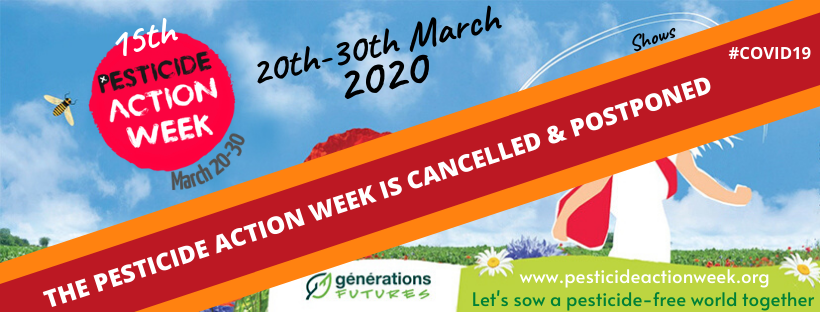Spring is upon us, a time when nature reawakens and pollinators finally come out again! The Covid-19 virus outbreak keeps us confined to our homes to help flatten the contagion curve for public safety - so why not take this opportunity to discover or strengthen our link to nature?
#bringtheoutdoorsindoors mini campaign
Observing the rebirth of life in spring is a fantastic way to distract ourselves from being stuck in quarantine by bringing the outdoors indoors.
Moreover, since spring is when pesticides resume being sprayed in our fields and on our streets (unbeknown to most, pesticides are actually widely sprayed in European cities), it is all the more important to maintain our link to biodiversity at this time if we want our precious pollinators to still have some space to survive.
Let us try out a few simple, easy and fun ideas for creating home & garden spaces to help biodiversity thrive!
For those having trouble keeping little ones entertained at home, it’s a great way to teach them about the importance of ecosystems, biodiversity, pollinators, bugs, etc. and about what they can do to help. Plus, it could be a good way to get them away from screens doing hands-on activities in the garden ;)
Even if you don’t have a garden, there are plenty of biodiversity-enhancing solutions that can be set up on balconies and windowsills (such as pots on a patio, herbs in a planter or even hanging baskets)!
Here are a few tips to bring the outdoors indoors that we put together for you:
-
If you are used to applying pesticides and other chemicals in your garden, stop now! Pesticides are widely recognised to have devastating effects on bees and other precious pollinators, as well as soil health;
-
Re-grow kitchen scraps for a windowsill/balcony vegetable box (carrots, celery, onions, garlic…);
-
Create "bug hotels": provide insect habitats by placing a small wood pile in a corner where bugs can nest and feed. This micro-habitat will decay over time and give a natural look. Use logs or sawn off tree branches but avoid treated wood. Even a small heap of pruned branches and twigs will give shelter and can be placed out of sight or on a balcony;
-
Leave trays with seeds and breadcrumbs for birds;
-
Place drinking troughs for bees and other pollinators; make sure these are no more than a few centimetres deep, and place pebbles in the middle so bees can avoid drowing in water too deep;
-
Give bees shelter by letting the grass grow: cutting the grass less often gives pollinators shelter and a place to feed;
-
Observe weeds growing in own garden (most of them are beautiful flowering plants that provide pollen and nectar to insects), learning & leaving "good" ones (dandelions or ragwort for instance but remove invasive plants such as japanese knotweed);
-
Plant bee-attractive indoors &/or balcony plant varieties to grow. Plant marigolds or multiply aromatic plants (lavender, basil, rosemary, thyme, dill, fennel...) on your balcony by dividing their roots and allow them to flower as they produce a lot of nectar (could exchange cuttings with people on neighbouring terraces or order seeds online);
-
Find further information by the Belgian federal public service for health, food chain safety and environment here;
-
Find further information & inspiration on Sussex University biology professor Dave Goulson's (PhD) Youtube channel;
We would love to hear your stories and experiences about enhancing biodiversity in your homes! Follow the steps below to take part in our #bringingtheoutdoorsindoors mini-campaign
Call to action:
-
Observe biodiversity in your home / windowsill / balcony / garden / allotment if you have one
-
Take pictures (flowers in bloom, bees, ladybugs, butterflies, etc.)!
-
Share them with us by tagging @EuropePAN on Twitter & using the hashtags #bringtheoutdoorsindoors #SPAP #stayhome #biodiversityathome
-
Check out our tips for bringing the outdoors indoors!
-
If you have any further suggestions or tips on how to bring the outdoors indoors, we’d love to hear them! Share them with us and we will upload them here!
Other ideas for actions to help biodiversity: Help save bees and farmers!
If you want to take your commitment to help biodiversity even further, check out the European Citizens’ Initiative (ECI) that PAN Europe and other civil society organisations recently launched.
We need *at least one million* signatures from citizens across Europe for EU institutions to officially accept our initiative and address our demands. We ask them to reform the EU’s broken food and farming system in favour of agroecology, a model that allows biodiversity, farmers and consumers to thrive alike. Your signature can go a long way in helping to protect health and the environment: sign the initiative today! When sharing online, remember to always use #savebeesandfarmers and the link to the signature collection on the ECI webpage.

